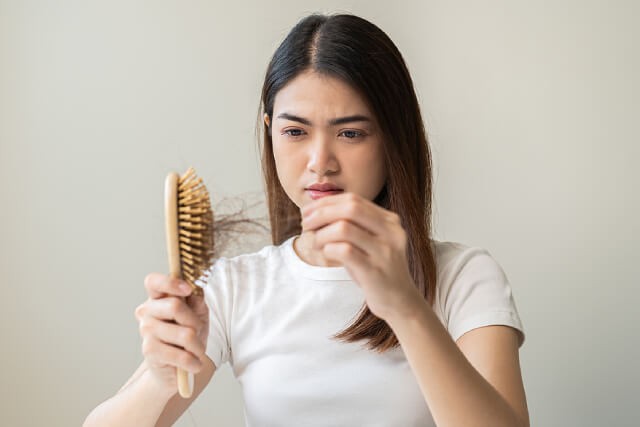
CAN IRON DEFICIENCY CAUSE HAIR LOSS?
Iron deficiencies are common and can produce a range of symptoms that impact daily life. But what about your hair? Does iron deficiency cause hair loss?
The Signs of an Iron Deficiency
It’s important to recognize an iron deficiency early so you can seek treatment when needed. Common signs include fatigue, pale skin, heart palpitations, a sore tongue, sores on the side of the mouth, cravings for ice, headaches, shortness of breath, dizziness, cold hands and feet, brittle nails, and dry hair and skin.
So, Can Iron Deficiency Cause Hair Loss?
Yes! Iron deficiency hair loss is possible,
although pinpointing the exact reason is difficult. One explanation is telogen effluvium, a type of hair loss triggered by intense stress on the body, which can occur due to iron deficiency. Another reason is that iron helps carry oxygen throughout the body. When hair follicles don’t receive enough oxygen and blood flow, hair growth may be disrupted.
Treating an Iron Deficiency
If you have an iron deficiency causing hair loss and other symptoms, treating it as soon as possible is crucial to prevent it from worsening.
The most common treatment is taking iron supplements. Your doctor may prescribe different types, including ferrous gluconate, ferrous fumarate, or ferrous sulphate.
You can also increase your iron levels by eating more iron-rich foods. Fortunately, there are many options, whether you eat meat, follow a gluten-free diet, or are vegetarian or vegan. Foods like leafy greens, fish, red meat, and seafood can help boost your iron levels.

Additionally, vitamin C enhances iron absorption. To maximize benefits, include more vitamin C in your diet. You can take a supplement or eat vitamin C-rich foods like broccoli, citrus fruits, tomatoes, potatoes, and peppers.
How to Know if Your Hair Loss is Caused by an Iron Deficiency?
Sometimes, treating iron deficiency doesn’t lead to hair regrowth. So, how can you tell if iron deficiency is the cause of your hair loss? The best way is to visit a doctor. A simple blood test will determine if your iron levels are low.

Treating Hair Loss Caused by an Iron Deficiency
If iron deficiency has caused hair loss, you’re likely wondering how to regrow your hair. The most effective approach is increasing your iron levels. As discussed, iron supplements or dietary changes should promote hair regrowth. You can also boost hair growth by using natural oils like rosemary or pumpkin seed oil.
Is Your Hair Not Growing Back?
Iron deficiency typically doesn’t cause permanent hair loss. Once treated, hair should regrow. However, if it doesn’t, another factor—such as androgenetic alopecia—may be the cause. In this case, consider alternative hair loss treatments.
Hair Loss Treatment Options
Fortunately, various hair restoration treatments can help you regain a full head of hair—or at least the appearance of one.
Hair Loss Medications:
The most common options are minoxidil and finasteride. Minoxidil, available for both men and women, boosts blood flow to the scalp and stimulates healing. Finasteride, a prescription medication for men only, works by preventing the production of DHT, the hormone responsible for male pattern baldness.
Low-Level Light Therapy:
This procedure uses lasers to stimulate healing and hair regrowth. Although it requires multiple sessions, many people see improvements in hair density.
Platelet-rich Plasma:
This treatment uses your own blood, which is processed to extract growth factors before being injected into the scalp. These growth factors help stimulate hair follicles, promoting regrowth.
Hair Transplants:
This minor surgical procedure involves transplanting hair follicles from a dense area to a balding section. Once the transplanted follicles take root, they begin growing natural hair. Since this solution is permanent, it remains a popular choice.
Can Iron Deficiency Cause Hair Loss: Final Thoughts
Now you know the answer: Yes, iron deficiency can contribute to hair loss, though not directly. Some people with very low iron levels may experience thinning hair, which can often be reversed with supplements or dietary changes. If you suspect an iron deficiency, consult a doctor to determine the best treatment plan.
Are you considering a hair transplant? If hair loss persists, you don’t have to accept it. Contact our friendly experts today to learn more, or check out our patient gallery to see our results.
